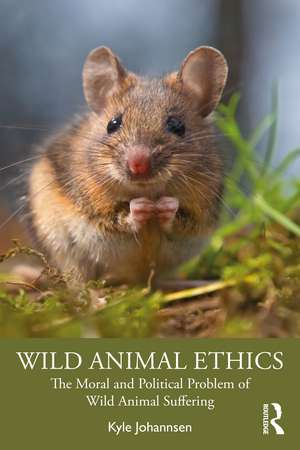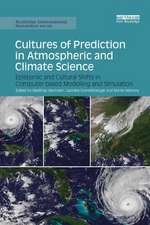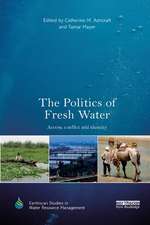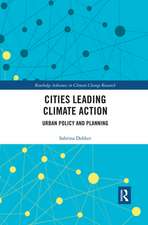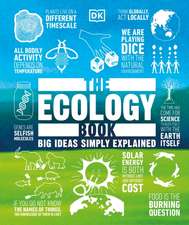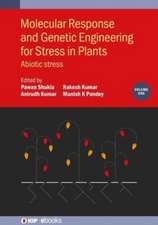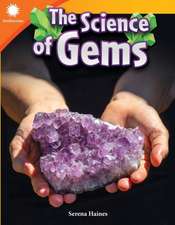Wild Animal Ethics: The Moral and Political Problem of Wild Animal Suffering
Autor Kyle Johannsenen Limba Engleză Paperback – 30 oct 2020
Questions addressed include:
- In what way is nature valuable and is intervention compatible with that value?
- Is intervention a requirement of justice?
- What are the implications of WAS for animal rights advocacy? What types of intervention are promising?
| Toate formatele și edițiile | Preț | Express |
|---|---|---|
| Paperback (1) | 369.73 lei 43-57 zile | |
| Taylor & Francis – 30 oct 2020 | 369.73 lei 43-57 zile | |
| Hardback (1) | 994.29 lei 43-57 zile | |
| Taylor & Francis – 30 oct 2020 | 994.29 lei 43-57 zile |
Preț: 369.73 lei
Nou
Puncte Express: 555
Preț estimativ în valută:
70.75€ • 74.06$ • 58.54£
70.75€ • 74.06$ • 58.54£
Carte tipărită la comandă
Livrare economică 07-21 aprilie
Preluare comenzi: 021 569.72.76
Specificații
ISBN-13: 9780367275709
ISBN-10: 0367275708
Pagini: 112
Dimensiuni: 152 x 229 x 12 mm
Greutate: 0.45 kg
Ediția:1
Editura: Taylor & Francis
Colecția Routledge
Locul publicării:Oxford, United Kingdom
ISBN-10: 0367275708
Pagini: 112
Dimensiuni: 152 x 229 x 12 mm
Greutate: 0.45 kg
Ediția:1
Editura: Taylor & Francis
Colecția Routledge
Locul publicării:Oxford, United Kingdom
Public țintă
Postgraduate and UndergraduateCuprins
1. Introduction 2. What’s so Good about Nature? 3. A Collective Obligation to Intervene 4. To Assist or Not to Assist? Assessing the Risks of Humanitarian Intervention in Nature 5. Editing Nature 6. Intervention and Animal Rights Advocacy
Notă biografică
Kyle Johannsen is Adjunct Assistant Professor in the Department of Philosophy at Queen's University, Kingston. He is primarily interested in social and political philosophy, and in animal and environmental ethics. His first monograph – A Conceptual Investigation of Justice – was published with Routledge in 2018, and his work has appeared in journals such as Dialogue, Environmental Values, Ethical Perspectives, Ethical Theory and Moral Practice, and Res Publica.
Recenzii
'Attention to wild animal suffering may be the most important recent development in animal ethics. It threatens to reverse a host of common judgments in environmental advocacy, conservation biology, and philanthropic cause prioritization. Kyle Johannsen has done an admirable job explaining why it matters, why we ought to do something about it, and feasible strategies for helping. This is book is essential reading for anyone concerned about wild animals and our responsibilities to them.'
Bob Fischer, Department of Philosophy, Texas State University
'Wild Animal Ethics is an excellent book that makes a powerful case for reducing wild animal suffering. Johannsen convincingly shows that assisting wild animals should be a top moral and political priority whether we care about animal welfare, animal rights, or both. He also addresses a number of important issues ranging from the ethics of killing predators to the ethics of genetic modification. Every reader will benefit from engaging with the arguments in this book, and wild animals will benefit enormously if we accept the main conclusions.'
Jeff Sebo, Affiliated Professor of Bioethics, Medical Ethics, and Philosophy, New York University
'Much has been written about the appalling suffering that we inflict on animals through practices such as factory farming. But the suffering of animals in the wild is vastly more extensive. Wild Animal Ethics defends the claim that although we are not the cause of this pervasive suffering, we nevertheless have moral reasons to try to mitigate it. Johannsen’s arguments are neither naïve nor utopian. They make a convincing case for the importance of research into ways of intervening beneficently in the natural world, particularly through techniques of genetic modification that could gradually, and without harmful side effects, diminish predation and modes of reproduction that doom the vast majority of offspring to early, painful deaths. The suffering of animals in the wild is a serious moral issue, to which this book is a sensible, well-argued, and humane response.'
Jeff McMahan, White’s Professor of Moral Philosophy, University of Oxford
'This is a slim volume of just 100 printed pages, but it delivers a big punch. The author does not shy away from the notion that this is a very personal assessment of wild animal suffering (WAS) and one that not everyone will agree with. His arguments however are well considered, referenced and, above all, written in a style that makes them accessible to all readers irrespective of their background in either philosophy, ethics, or animal welfare.'
Elizabeth Mullineaux, Animal Welfare
Bob Fischer, Department of Philosophy, Texas State University
'Wild Animal Ethics is an excellent book that makes a powerful case for reducing wild animal suffering. Johannsen convincingly shows that assisting wild animals should be a top moral and political priority whether we care about animal welfare, animal rights, or both. He also addresses a number of important issues ranging from the ethics of killing predators to the ethics of genetic modification. Every reader will benefit from engaging with the arguments in this book, and wild animals will benefit enormously if we accept the main conclusions.'
Jeff Sebo, Affiliated Professor of Bioethics, Medical Ethics, and Philosophy, New York University
'Much has been written about the appalling suffering that we inflict on animals through practices such as factory farming. But the suffering of animals in the wild is vastly more extensive. Wild Animal Ethics defends the claim that although we are not the cause of this pervasive suffering, we nevertheless have moral reasons to try to mitigate it. Johannsen’s arguments are neither naïve nor utopian. They make a convincing case for the importance of research into ways of intervening beneficently in the natural world, particularly through techniques of genetic modification that could gradually, and without harmful side effects, diminish predation and modes of reproduction that doom the vast majority of offspring to early, painful deaths. The suffering of animals in the wild is a serious moral issue, to which this book is a sensible, well-argued, and humane response.'
Jeff McMahan, White’s Professor of Moral Philosophy, University of Oxford
'This is a slim volume of just 100 printed pages, but it delivers a big punch. The author does not shy away from the notion that this is a very personal assessment of wild animal suffering (WAS) and one that not everyone will agree with. His arguments however are well considered, referenced and, above all, written in a style that makes them accessible to all readers irrespective of their background in either philosophy, ethics, or animal welfare.'
Elizabeth Mullineaux, Animal Welfare
Descriere
Using concepts from moral and political philosophy to analyze the question of wild animal suffering, Kyle Johannsen explores how a collective, institutional obligation to assist wild animals should be understood.
